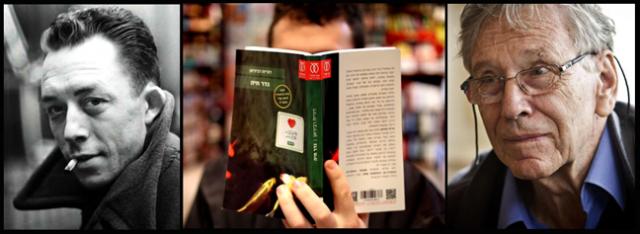

| Online: | |
| Visits: | |
| Stories: |

| Story Views | |
| Now: | |
| Last Hour: | |
| Last 24 Hours: | |
| Total: | |
Israel Moves to Check Its Artists
John Grant
A new thought occurred to Rami. It soothed him like a gentle caress. Not all men are born to be heroes. Maybe I wasn’t born to be a hero. But in every man there’s something special, something that isn’t in other men. In my nature, for instance, there’s a certain sensitivity. A capacity to suffer and feel pain. Perhaps I was born to be an artist.
– Amoz Oz, Elsewhere, Perhaps, a 1966 novel of kibbutz life
As a writer/photographer and a tax-paying American citizen, a story in the New York Times about Israel’s culture wars made me cringe. It seems the powerful, militarist right in Israel — so committed to expansion and settlements in the West Bank — is now trying to suppress ideas among the nation’s artistic and literary minds.
 Albert Camus; the banned novel Borderlife and Amos Oz
Albert Camus; the banned novel Borderlife and Amos Oz
Human creativity amounts to an individual human mind with its rich, active sub-conscious engaging in a dialogue with the outer realities of life. The mash-up that results is called Art. It’s a process that’s often infused with a subversive sensibility at odds with established power. In his perfect republic, Plato banned poets. Tyrants throughout history have been threatened by artists and writers. Hitler, of course, gave up on an artistic career in order to rule Germany and the world as his own personal work of art; he had men like Joseph Goebbels to assure artists and writers weren’t a threat. Art that didn’t promote Aryan purity and German superiority was “decadent” and banned; careers were destroyed. The impulse to attack artists and to cut off their patronage and funding is as old as tyranny itself.
It’s the perennial struggle between Power and Truth. In the short-term, Power can, and often does, run over Truth like a tank in the streets; while in the long run, Truth has the tendency to eat away at, and undermine, that Power. It’s at this juncture — when Power has made its play and relegated Truth to writhing in the dust — that the book burners and the state culture warriors begin to attack the arts for disloyalty, a failure of patriotism or in the end with trying to destroy the state.
In the novel Elsewhere, Perhaps, Amos Oz uses a mixture of third person and first person narration that ends up making the kibbutz called Metsudat Ram a character in his story. The character Rami, referenced in the quote at the top, is a sensitive young man. His father is dead and his older brother Yoash was killed in the Suez action. Part of him wants to be a hero like Yoash. He doesn’t want to be a mama’s boy. So he joins the infantry to fight Israel’s enemies. While away, his girlfriend Noga takes up with an older man. Rami’s artistic sensibilities haunt him. In the end, he becomes a synthesis of tough and sensitive and marries Noga.
A news collective, founded as a blog in 2004, covering war, politics, environment, economy, culture and all the madness
Source: http://thiscantbehappening.net/node/3031


